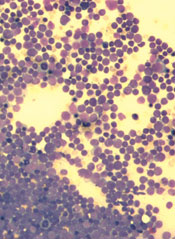
Two genes appear to play a key role in acute lymphoblastic leukemia (ALL), particularly for patients who also have Down syndrome.
Researchers found evidence suggesting that 2 in 3 cases of ALL among patients with Down syndrome may be caused by mutations in RAS or JAK2, but the mutations tend not to occur together.
The group therefore believes that if we can begin to identify which of the genes is mutated in ALL patients, we can tailor therapy accordingly.
“We believe our findings are a breakthrough in understanding the underlying causes of leukemia, and, eventually, we hope to design more tailored and effective treatment for this cancer, with less toxic drugs and less side effects,” said study author Dean Nizetic, MD, PhD, a professor at both Queen Mary University of London in the UK and Lee Kong Chian School of Medicine in Singapore.
He and his colleagues reported their findings in Nature Communications.
The researchers conducted full-exome or targeted sequencing in 42 samples from 39 patients with ALL and Down syndrome. The team found similar recurrence rates for driver mutations in RAS (15/42), JAK2 mutations (12/42), and P2RY8-CRLF2 fusions (14/42).
Together, RAS and JAK2 mutations drove two-thirds of the ALL cases, though the mutations were almost completely mutually exclusive (P=0.016).
The researchers also noted that, in two-thirds of patients with relapsed ALL, there was a switch from a primary JAK2- or PTPN11-mutated subclone to a RAS-mutated subclone in relapse.
Moving forward, the team plans to conduct more studies to determine how else RAS and JAK2 might affect children who have ALL, with or without Down syndrome.

